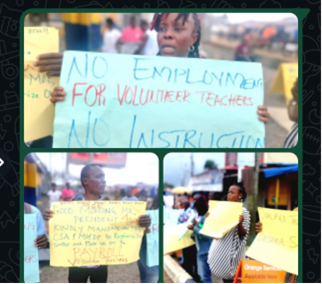The plight of volunteer teachers in Liberia reached a boiling point on September 1, 2025, as over two thousand educators, united under the banner of the National Volunteer Teachers Association, staged a protest outside President Joseph Nyuma Boakai’s residence. Their central demand: to be officially recognized and compensated for their years of unpaid service in public schools across the nation. Carrying placards that eloquently expressed their frustration and determination – “No employment for volunteer teachers, no instruction,” “Qualified teachers deserve salaries,” “Stop exploiting volunteer teachers,” and “MOE, respect education” – they sought to amplify their voices and bring their concerns to the highest level of government. The protest, spearheaded by the association’s spokesperson, Patrick Walker, underscores a long-standing issue of broken promises and bureaucratic inertia within the Liberian education system.
The volunteer teachers, initially gathered at the President’s official residence, were subsequently redirected by law enforcement to Rehab Junction, a location further removed from the presidential premises. This physical displacement mirrored the perceived marginalization they experience within the education system, a feeling captured in Walker’s poignant statement: “We are treated like we’re not human.” Their grievances are directed at multiple government entities, including the Ministry of Education (MOE), the Ministry of Finance and Development Planning (MFDP), and the Civil Service Agency (CSA), all of whom they accuse of repeated delays and unfulfilled assurances regarding their employment status. Despite previous commitments from Finance Minister Augustine Kpehe Ngafuan to place volunteer teachers on the government payroll following the passage of the national budget, these educators remain unpaid, fueling their growing resentment and desperation.
The crux of the issue lies in the disconnect between promises made and actions taken. Last year, the Ministry of Education vetted 6,000 volunteer teachers, deeming 3,755 qualified for employment. Minister Jarso Jallah reportedly pledged to place 2,000 of these qualified teachers on the payroll in the first phase of integration – 1,000 as replacements for existing vacancies and another 1,000 as new hires. The remaining qualified teachers were promised employment in a subsequent phase. According to Walker, despite accepting this plan in good faith, the volunteer teachers have seen no tangible progress. Numerous meetings with Assistant Minister for Fiscal Affairs Jonathan Jackson and various HR officials have yielded no results, leaving the teachers feeling disillusioned and betrayed. They contend that these officials continually cite ongoing collaborations with District and County Education Officers as justification for the delays, yet no concrete action has been taken.
The protest highlights the significant personal sacrifices made by these volunteer teachers. Many have dedicated years, even decades, of their lives to educating Liberian children without receiving any compensation. Walker’s testimony reveals the extent of this commitment, with some teachers having served for 5, 10, or even 15 years without pay. Their assembly at the President’s residence underscores the urgency of their situation and their determination to be heard. The threat of withholding their services until their demands are met – “If nothing is done, our people will not return to the classrooms until they are placed on payroll” – underscores the potential for disruption to the education system if the government fails to act. The looming sense of hopelessness expressed by Walker emphasizes the precarious position of these teachers and the potential consequences for the future of education in Liberia.
In response to the protest, Maxim Bleteen, Director of Communications at the Ministry of Education, acknowledged the ongoing process of integrating volunteer teachers into the payroll system. He confirmed that the vetted list of qualified teachers has been submitted to the Civil Service Agency, but pointed to constraints imposed by the national budget cycle. Bleteen explained that the annual budget for the 2025 fiscal year had already been finalized, making it logistically challenging to add new employees to the payroll mid-year. He emphasized Education Minister Jallah’s commitment to addressing the situation in the upcoming fiscal year, assuring the protesting teachers that their concerns are on the Ministry’s radar. However, this explanation is unlikely to satisfy the volunteer teachers, who have heard similar assurances in the past without seeing tangible results.
The timing of this protest, coinciding with the official reopening of public schools across the country, further amplifies its impact. The potential for widespread disruption to education services adds pressure on the government to find a swift and equitable solution. The protest underscores the complex challenges facing Liberia’s education system, including limited resources, bureaucratic hurdles, and the reliance on unpaid volunteer teachers. It raises fundamental questions about the value placed on education and the commitment to supporting those who dedicate their lives to teaching. The ongoing struggle of these volunteer teachers serves as a stark reminder of the need for systemic change and greater investment in human capital to ensure a brighter future for Liberia’s children.














